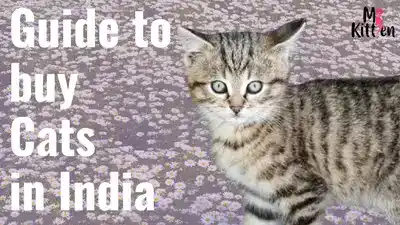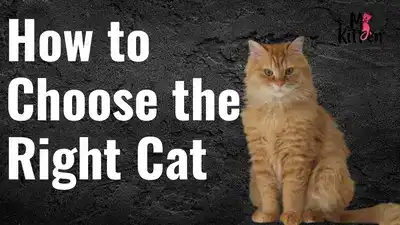Why Is My Cat Not Eating? Causes & Solutions for Loss of Appetite
Why Is Your Cat Not Eating? Understanding the Causes
Have you ever wondered if your feline friend’s loss of appetite is a sign of a deeper issue? Cats are known for their finicky eating habits, but a persistent lack of interest in food can be a worrying sign for pet owners.
A cat’s refusal to eat can stem from various factors, including stress, underlying health problems, or even changes in their environment. Understanding the reasons behind this behavior is crucial to ensure your cat’s health and well-being.
Identifying the cause is the first step towards finding a solution. By exploring the potential reasons and corresponding solutions, you can help your cat regain their appetite and maintain a healthy lifestyle.
How to Encourage Your Cat to Eat Again ?
Understanding Your Cat's Normal Eating Behavior
Observing and understanding your cat’s normal eating behavior is key to detecting health issues early. Cats are known for their unique personalities, and their eating habits can be just as distinct.
Normal appetite in cats can vary significantly based on factors such as age, health, and lifestyle. For instance, kittens tend to eat more frequently than adult cats due to their high energy needs for growth and development.
Adult cats, on the other hand, may have more stable eating patterns, but their appetite can still be influenced by their level of physical activity and overall health. Some cats are naturally more finicky eaters, while others may be more voracious.
Influencing Factors
Several factors can influence a cat’s eating behavior, including dietary changes, environmental stress, and health conditions. Understanding these factors can help you identify why your cat’s appetite may be fluctuating.
For example, a change in your cat’s environment, such as moving to a new home or the introduction of a new pet, can cause stress that may affect their appetite. Similarly, health issues like dental problems or gastrointestinal disorders can make eating uncomfortable or painful, leading to a decrease in appetite.
By closely monitoring your cat’s eating behavior and being aware of the factors that can influence it, you can better understand what is normal for your pet and take appropriate action if you notice any significant changes.
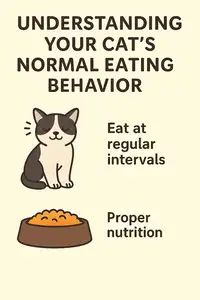
Why Is My Cat Not Eating? Causes & Solutions for Loss of Appetite
Understanding why your cat is not eating requires examining several potential causes, including environmental changes and behavioral factors. Cats are highly sensitive to their surroundings, and even minor changes can affect their appetite.
Changes in Routine or Environment
Cats thrive on routine. Changes such as a new work schedule, moving furniture, or even a different feeding location can cause stress, leading to a decrease in appetite. Ensuring a stable and predictable environment can help mitigate this issue.
The introduction of new family members or pets can be a significant stressor for cats. They may feel territorial or anxious, leading to a loss of appetite. Gradual introductions and maintaining a safe space for your cat can help reduce this stress.
Travel or Relocation Stress
Cats are creatures of habit and can be severely stressed by travel or relocation. The change in environment can cause them to stop eating. Providing familiar items like their favorite food, toys, or bedding during travel can offer comfort.
Behavioral Factors Affecting Appetite
Behavioral issues, such as anxiety or depression, can also affect a cat’s appetite. Identifying the root cause of these issues, whether it’s a change in the household or a medical issue, is crucial. Consulting with a veterinarian or a certified animal behaviorist can provide insights and solutions.
Food Preferences and Aversions
Cats can be finicky eaters, and their preferences can change over time. Sometimes, a cat may refuse to eat due to a dislike for the current food. Offering a variety of high-quality foods or warming the food slightly can make it more appealing.
By understanding and addressing these potential causes, you can help restore your cat’s appetite and ensure they continue to eat healthily.
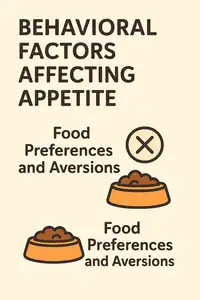
Check and verify every symptom your cat shows
Cats with an unpredictable nature might refuse to eat sometimes without any clear reason. Besides any cat’s intentions, they are meat lovers. They need a well-balanced diet that includes vitamins, amino acids, and various other minerals according to their age and breed.
1. Determining Stress from Various Factors
It’s your responsibility to keep your cat happy and healthy. You need to take care of a lot of things after you buy a cat or kitten.
You need to keep your little friend stress free. The stress factor is related to many surrounding issues. Stress may occur due to any location or house change, this brings curiosity and can be easily frightened about it.
A new family member or an animal can bring a variant level of emotions in them, including aggression, withdrawal, or sudden litter box avoidance. This can be reduced by the cat owner by introducing the cat to the new member and assuring them the same attention.
A sudden visit to the veterinary can be stressful and scary for some pets. It is advised to keep a small blanket over the top of the crate to help them calm inside the crate while you drive her to the vet.
Due to any death of a family member, cats grieve like humans. The pet must be reassured by giving more attention and love to cover up the loss.
Another reason can be fear from sudden sources like natural calamities, extreme noises.
Stress due to traveling to different places that can change its surroundings and routine feeding time, resulting in a loss of appetite.
2. Extreme Mood Swings Due to their Whimsical Nature
Cat’s changeable nature is known by all, If your cat is not eating it could simply be a whim. Refusing to eat their food can be one of the ways of asking for different food and tastier treat.
A better idea is to change the same tasted food with flavours. Also, decrease treating your kitty too much, this could make them more besotted over treats then formulas or regular foods.
Sometimes vitamins and added supplements taste bitter with food, and this can be one of the reasons for a cat not eating.
3. Unknown Underlying Health Problems
The following health problems can lead to loss of appetite:
A toothache, Kidney Failure, Heart Problems, Gastrointestinal Diseases, Cancer, and Pancreatitis leaving them in total distress.
Don’t be fooled by your cat’s easy face, as it does not always mean she cannot have any health problems. One of the main reasons for the cat not eating is their upsetting health issues.
The reason remains unknown most of the time as cats do not express their pain. It is advised to visit our vet as soon as you notice your cat is losing her appetite. Sudden loss of appetite can be a cause of a recent vaccination, neutering, or spraying.
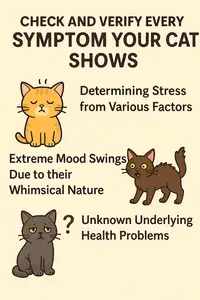
Modify the Food to Attract your Cat
- Reduce the number of treats per week.
- Mix-up tasty teats with their food when they refuse to eat their regular diet.
- Try for odourless vitamins and supplements.
- Never serve cold or frozen food to the cat.
- With their growing age, try serving foods with variant consistency(liquid/wet, solid/dry).
- Also, try different brands of a different flavour from MyKitten to change their whimsical mind.
- Fed your kitty an exact time every day and night to bring it to inhabit.
- Ensure your cat eats her daily meals, by using an automatic feeder.
- Provide meals in clean and fresh bowls.
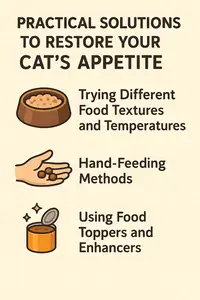
Unknown Underlying Health Problems
Loss of appetite in cats can be a symptom of various health problems, some of which may be serious. It is crucial to identify the underlying cause to provide appropriate care.
Inflammatory Bowel Disease
Inflammatory bowel disease (IBD) is a condition that affects the digestive system of cats, leading to symptoms such as loss of appetite, vomiting, and diarrhea. IBD can cause significant discomfort, making it essential to manage the condition through dietary changes and veterinary care.
Parasites, such as worms, and infections can cause a cat to lose its appetite. These parasites can lead to gastrointestinal issues, and if left untreated, can result in more severe health problems. Regular check-ups with a veterinarian can help identify and treat these issues early on.
Signs of Serious Illness
Some underlying health issues can be signs of serious illnesses, such as kidney disease, diabetes, or cancer. Monitoring your cat’s behavior, including changes in appetite, is vital for early detection and treatment. If your cat shows persistent loss of appetite, it is crucial to seek veterinary help.
Understanding these potential health issues can help cat owners take proactive steps to ensure their pets receive the necessary care. By addressing the underlying cause of a cat’s loss of appetite, owners can help restore their cat’s health and well-being.
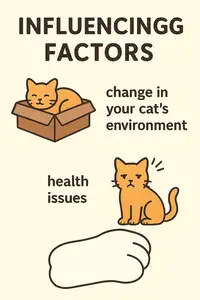
Practical Solutions to Restore Your Cat's Appetite
If your cat is experiencing a loss of appetite, there are several practical solutions you can try to stimulate their interest in food again. Cats can be sensitive to changes in their environment and diet, so it’s essential to approach the problem with a combination of patience and experimentation.
Trying Different Food Textures and Temperatures
Cats often have preferences when it comes to the texture and temperature of their food. Some cats prefer their food to be warm, as it can enhance the aroma and make it more appealing. You can try warming their food slightly, but be sure not to make it too hot. Additionally, varying the texture by mixing wet and dry food or trying different types of wet food can help stimulate their appetite.
Sometimes, a cat’s loss of appetite can be due to a lack of interest in their current food. Switching to a different brand or changing the protein source (e.g., from chicken to salmon) can make a significant difference. It’s also worth considering a rotation diet, where you periodically change the type of food to keep mealtime interesting.
Hand-Feeding Methods
Hand-feeding can be an effective way to encourage your cat to eat, as it involves personal interaction and can stimulate their appetite. Start by offering small amounts of food on your fingers or from a spoon. This method not only helps in feeding but also strengthens the bond between you and your cat.
Using Food Toppers and Enhancers
Food toppers and enhancers can add flavor and aroma to your cat’s meals, making them more appealing. These can range from freeze-dried chicken or salmon to cat gravies. Adding a small amount of these toppers can significantly enhance the palatability of their food and encourage eating.
By implementing these practical solutions, you can help restore your cat’s appetite and ensure they are receiving the necessary nutrients for their health and well-being.
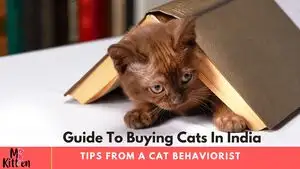
The only thumb rule is to be patient! Good Luck!
When to Seek Veterinary Help
The decision to seek veterinary help for a cat with loss of appetite depends on several factors. Understanding these factors is crucial for cat owners to ensure their pets receive timely medical attention.
Duration of Appetite Loss
The length of time your cat has not been eating is a critical factor. Generally, if your cat hasn’t eaten for more than 24 to 48 hours, it’s a cause for concern. Prolonged fasting can lead to serious health issues, including hepatic lipidosis, a potentially life-threatening condition.
Other symptoms accompanying your cat’s loss of appetite are also important indicators. These can include vomiting, diarrhea, lethargy, or changes in drinking habits. If your cat shows any of these signs, seeking veterinary help is advisable.
Diagnostic Tests
Upon visiting a veterinarian, various diagnostic tests may be performed to determine the cause of your cat’s loss of appetite. These can include blood tests, urinalysis, imaging studies like X-rays or ultrasound, and dental examinations. The specific tests used depend on the cat’s overall health, age, and other factors.
Treatment Options
Treatment for a cat not eating varies based on the underlying cause. It can range from simple dietary changes to hospitalization for intravenous fluids and nutritional support. In some cases, medication may be prescribed to stimulate appetite or address underlying conditions.
In conclusion, while an occasional day of not eating may not be alarming, persistent loss of appetite in cats warrants careful observation and potentially veterinary intervention. By understanding the factors that indicate when to seek help, cat owners can play a proactive role in maintaining their cat’s health.

The only thumb rule is to be patient! Good Luck!
Preventive Measures for Maintaining Healthy Eating Habits
Maintaining your cat’s appetite is crucial for their overall health and well-being. To prevent loss of appetite, it’s essential to establish a routine that promotes healthy eating habits in cats.
One effective way to maintain a cat’s appetite is by providing a balanced and nutritious diet. Feeding high-quality cat food that meets their nutritional needs can help stimulate their appetite. Additionally, creating a stress-free environment during meal times can also contribute to healthy eating habits.
Regular veterinary check-ups can help identify any underlying health issues that may affect your cat’s appetite. By taking proactive measures, you can prevent loss of appetite and ensure your cat continues to eat well. Simple changes, such as rotating food flavors or adding a small amount of wet food to their meals, can also help keep mealtime interesting and encourage your cat to eat.
By implementing these strategies, you can help maintain your cat’s appetite and promote a healthy relationship with food.

The only thumb rule is to be patient! Good Luck!
FAQ
Why is my cat not eating its favorite food?
Can stress cause a cat to lose its appetite?
How can I stimulate my cat’s appetite?
What are some signs that my cat’s loss of appetite is due to a serious health issue?
How long can a cat go without eating before it’s a concern?
Can inflammatory bowel disease cause loss of appetite in cats?
Are there any preventive measures I can take to maintain my cat’s healthy eating habits?
What diagnostic tests might a veterinarian perform to determine the cause of my cat’s loss of appetite?

The only thumb rule is to be patient! Good Luck!

